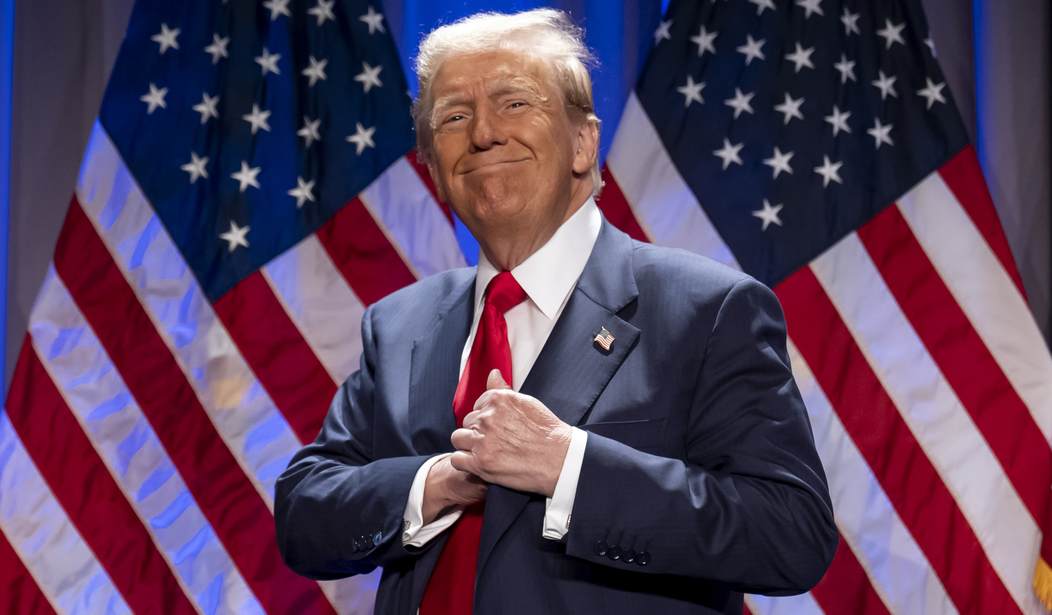When President Donald Trump gave his inaugural address in the U.S. Capitol on Monday, he included an explanation of his trade policy.
"I will immediately begin the overhaul of our trade system to protect American workers and their families," he said.
How will he do this? By imposing tariffs on imports.
"Instead of taxing our citizens to enrich other countries, we will tariff and tax foreign countries to enrich our citizens," he said. "For this purpose, we are establishing the External Revenue Service to collect all tariffs, duties and revenues. It will be massive amounts of money pouring into our Treasury, coming from foreign sources."
Such a proposal would have sounded familiar to the Americans who wrote and ratified the Constitution and served in the first Congress -- or in President George Washington's administration.
As originally written and ratified, the Constitution did not envision a federal government funded by income taxes. Article 1, Section 2, Clause 3 stated that "direct Taxes" needed to be divided among the states according to their populations -- just as members of Congress are. "Representatives and direct Taxes shall be apportioned among the several States which may be included within this Union, according to their respective Numbers," it said.
By contrast, Article 1, Section 8, Clause 1 gave the federal government the power to raise revenue by imposing tariffs on imports. "The Congress shall have Power To lay and collect Taxes, Duties, Imposts and Excises, to pay the Debts and provide for the common Defence and general Welfare of the United States; but all Duties, Imposts and Excises shall be uniform throughout the United States."
Recommended
As Supreme Court Justice Joseph Story explained in his Commentaries on the Constitution of the United States, which was published in 1833, these constitutional provisions resulted in tariffs being the primary source of federal revenue.
"The principle of representation is constant, and uniform; the levy of direct taxes is occasional, and rare," wrote Story. "In the course of forty years, no more than three direct taxes have been levied; and those only under very extraordinary and pressing circumstances. The ordinary expenditures of the government are, and always have been, derived from other sources. Imposts upon foreign importations have supplied, and will generally supply, all the common wants; and if these should not furnish an adequate revenue, excises are next resorted to, as the surest and most convenient mode of taxation. Direct taxes constitute the last resort; and (as might have been foreseen) would never be laid, until other resources had failed."
When the first Congress convened in 1789, James Madison of Virginia proposed a bill to impose tariffs for the purpose of funding the government. "Very soon after Congress met, which was in April 1789, Madison, recognizing the pressing need of revenue, offered a resolution calling for the adoption of the impost, which, from 1783 to 1789, Congress had, in vain, urged upon the states," wrote William Hill in an essay published in 1893 in the University of Chicago's Journal of Political Economy. "He stated distinctly that the object of the measure was to raise revenue, that it was to be a temporary expedient, to remain in force only till a comprehensive system could be arranged."
Thomas Fitzsimons, a representative from Pennsylvania, objected to Madison's measure. He believed Congress needed to enact a tariff bill that also protected American industry.
"He therefore moved to substitute for the plan offered by Madison the Pennsylvania system of protection," wrote Hill.
"After full discussion and due deliberation, the protective duties proposed by Fitzsimons were preferred to the revenue duties advocated by Madison," wrote Hill in 1893. "Thus, in the very beginning of United States tariff legislation, protection found the place which it has maintained with little interruption till the present day."
"Neither Madison nor any other member questioned the authority of the government which they had created to levy taxes high enough to give any desired protection, or even to prohibit importations for the same purpose," Hill wrote.
Washington signed this tariff bill into law on July 4, 1789.
Its first section unambiguously stated that "it is necessary for the support of government, for the discharge of the debts of the United States, and the encouragement and protection of manufactures, that duties be laid on goods, wares and merchandises imported."
In addition to protecting American manufacturers, the practice of funding the federal government through tariffs also protected American taxpayers. Someone who decided not to buy a product imported from another country did not pay the tariff on it.
Things changed with ratification of the 16th Amendment in 1913. It gave Congress the "power to lay and collect taxes on incomes, from whatever source derived, without apportionment among the several States, and without regard to any census or enumeration."
In 1910, according to a report by the Tax Foundation, federal revenues were 2.0% of Gross National Product. In 2010, they were 16.1% of Gross Domestic Product.
Trump should use every penny raised from his tariffs on foreign imports to reduce the income taxes on American workers.
Terence P. Jeffrey is an editor of the Daily Caller News Foundation.

























Join the conversation as a VIP Member